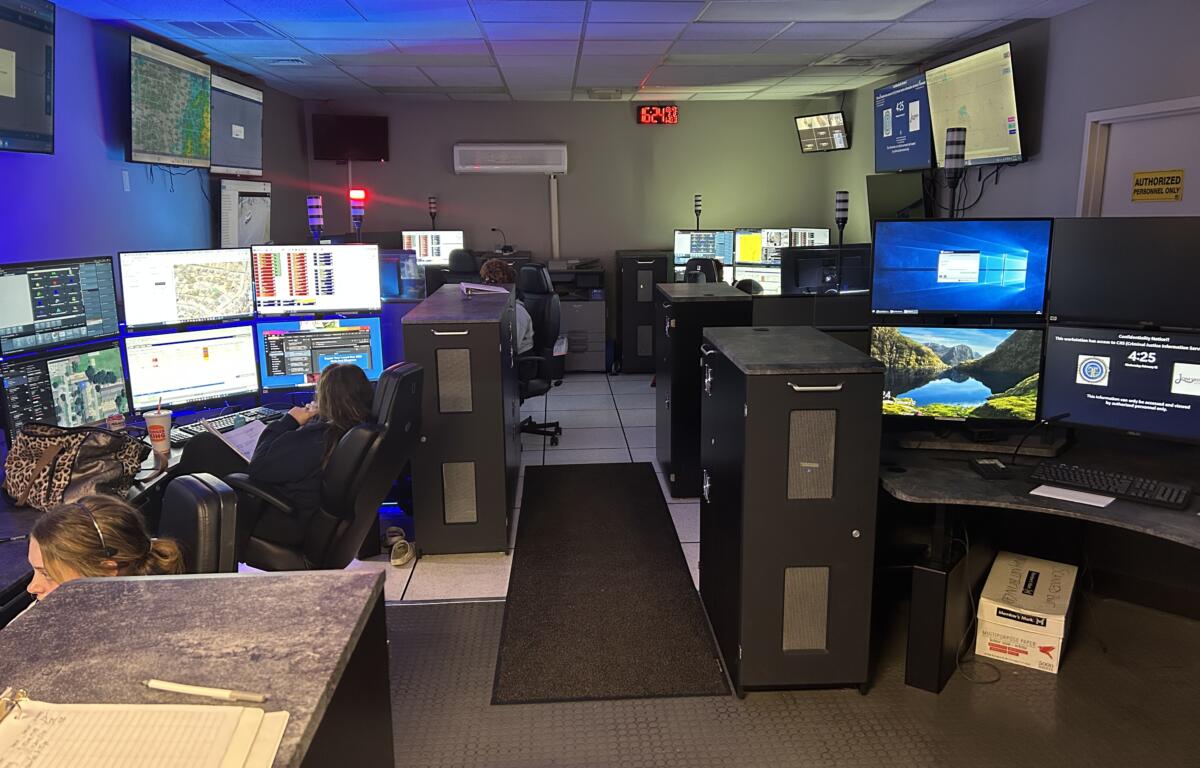Jonesboro, AR – (JonesboroRightNow.com) – Feb. 27, 2025 – In the heart of Jonesboro, inside the walls of the E-911 emergency dispatch center, a team of highly trained professionals works around the clock to ensure that every call for help is met with swift action.
Among them are Hanna Mitchell, a 911 dispatcher with four years of experience, and Cristy Hundley, the center’s Training Coordinator for the last two years. Together, they provided JRN a glimpse into their jobs.
Mitchell describes her role as both fulfilling and intense.
“I love my job,” she said. “I like that I get to help people. There is nothing like knowing that you can make a difference, to calm somebody down when they’re having one of the worst moments of their life.”
Hundley echoes this sentiment. “I love teaching new people. There’s something really rewarding about helping someone develop the skills they need to succeed in this job.”
But both agree that the job is not without its hardships. Mitchell said the work is stressful, but she finds solace in the camaraderie of her colleagues.
“We have an incredible support system here, and the people that we work with understand the situation. Any time something is hard to deal with, they get us the resources we need. It makes a big difference to have supervisors that care about more than just you being here—they care about your mental health.”
Hundley has seen firsthand how vital support is in this profession.
“Some new hires come in, see what we do, and say, ‘That’s a little much for me.’ They realize they didn’t know what they were getting into.” The demands of the job require emotional resilience, as dispatchers often deal with traumatic situations that linger even after a shift ends.
Mitchell describes a typical shift as unpredictable: “You never know what kind of calls you’re going to get.”
Each shift at the center consists of four to five dispatchers working 12-hour rotations:
- A Shift: 6 a.m. to 6 p.m.
- B Shift: 6 p.m. to 6 a.m.
- C & D Shifts: Rotating schedules
The workload varies, with each dispatcher handling around 150 calls per shift on slower days. One person runs city and county fire calls, another handles Jonesboro police officers, one provides background information for each call, and another handles county calls. If the center is short-staffed, dispatchers will handle multiple areas.

The volume of emergency calls has increased in recent years due to Jonesboro’s growth.
“Shootings, people dying—it happens more often than you’d think,” Mitchell said. “At least twice a week, we have really hard days.” Some of the most harrowing calls involve only the sound of labored or agonal breathing. “It’s usually a stroke or heart attack. That’s a sound you don’t forget.”
Before a new dispatcher ever handles a call alone, they undergo a month of classroom training, followed by three to five months of on-the-job training.
The job requires a mix of technical skills, quick thinking, and emotional strength. Dispatchers need to be adaptable, detail-oriented and confident, as Hundley said dispatchers must give “clear, decisive instructions, sometimes in life-or-death situations.”
“Dispatchers work on computers for eight to 12 hours a day, so being comfortable with technology is a must,” Hundley added. “Knowing the city and county layout is also crucial, along with staying calm under pressure.”
Handling distressing calls can take an emotional toll, and both Mitchell and Hundley have developed their own coping mechanisms.
“It’s hard to shake off a rough day,” Mitchell said. “But I exercise and read to clear my mind. It also makes me appreciate what I have, knowing that others have lost so much.”
She has witnessed the mental strain that dispatchers face and emphasizes the importance of resilience. “At some point, you’ll take a call about someone you know,” she said. “That can be tough, and you have to be prepared for it.”
Hundley said she’s excited about the implementation of Emergency Medical Dispatch (EMD) in March, a program designed to enhance dispatcher response capabilities. The program will involve dispatchers asking more questions of the person calling in, Hundley said, but it will better prepare emergency responders on their way to the scene.
She explains how EMD will allow dispatchers to provide life-saving instructions over the phone. “We’ll be able to guide callers through CPR, bleeding control, and even childbirth procedures. This will make a real difference in our ability to serve the community.”
For Mitchell, the passion for her work remains unwavering.
“I love the people I work with, I love my supervisors, and I love what I do.”


